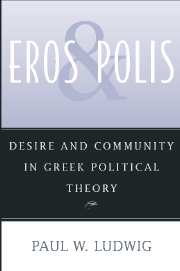Book contents
- Frontmatter
- Contents
- Acknowledgments and a Note on Citations
- Introduction
- PART ONE Political Eros: An Account from the Symposium
- PART TWO The Discourse of Political Eros
- THREE Scientific and Poetic Traditions of Eros in Thucydides
- FOUR The Problem of Aggression
- FIVE The Problem of Sublimation
- PART THREE The Polis as a School for Eros
- List of Works Cited
- Index
THREE - Scientific and Poetic Traditions of Eros in Thucydides
Published online by Cambridge University Press: 10 December 2009
- Frontmatter
- Contents
- Acknowledgments and a Note on Citations
- Introduction
- PART ONE Political Eros: An Account from the Symposium
- PART TWO The Discourse of Political Eros
- THREE Scientific and Poetic Traditions of Eros in Thucydides
- FOUR The Problem of Aggression
- FIVE The Problem of Sublimation
- PART THREE The Polis as a School for Eros
- List of Works Cited
- Index
Summary
“Contemplate the power of the city, day by day, and become her lovers.”
(Pericles' Funeral Oration, Thucydides 2.43.1)Eros fell upon all alike to sail forth.
(Thucydides 6.24.3)In Part I of this study we analyzed the discourse of political eros as it appeared in a small number of texts: the Symposium and the highly eccentric comedies of Aristophanes. The implications of that analysis now force us to look beyond those texts, to ask whether and how the ideas propounded there were situated in contexts of wider contemporary belief. As a wide variety of sources will show, the diverse contentions of Plato and of Aristophanes did indeed belong to a larger erotic discourse, the existence of which can be seen in several poetic, rhetorical, and philosophical strands, including, in particular, Thucydides' history of the Peloponnesian War. In all of these contexts, eros was applied to nonsexual, nonbodily objects. It should be stressed that the three major exponents of political eros, Plato, Aristophanes, and now Thucydides, are each sui generis. Thucydides is no more “representative” of the times than Plato or Aristophanes is. Certainly no widely shared “theory” of eros and politics developed during this period, and each of the three authors can be seen to disagree with the other two in important respects. The evidence does suggest, however, the existence of a long poetic tradition of nonsexual or extrasexual eros, of a brief rhetorical fashion in the fifth century, as well as of a persistent sophistic and philosophic tendency to impose conformity on human desires by grouping them all under the rubric of eros.
- Type
- Chapter
- Information
- Eros and PolisDesire and Community in Greek Political Theory, pp. 121 - 169Publisher: Cambridge University PressPrint publication year: 2002

